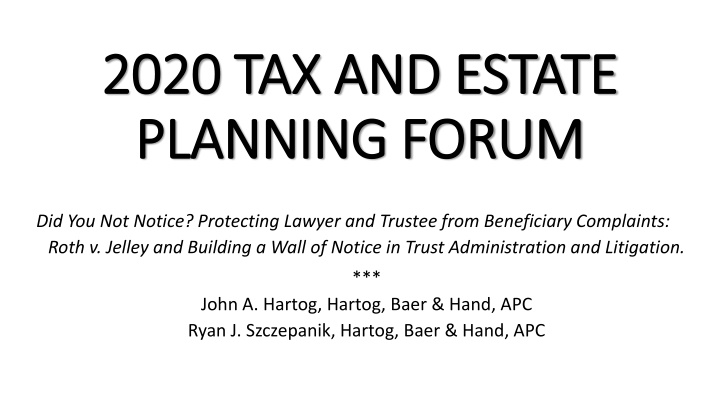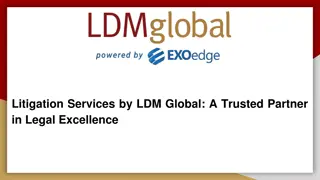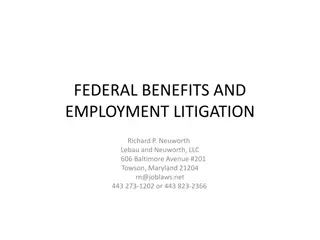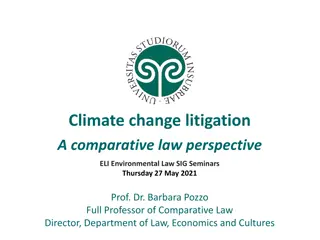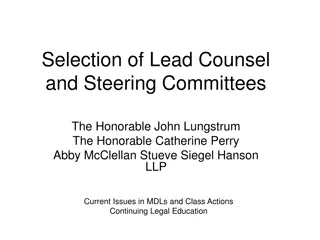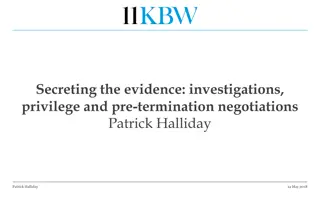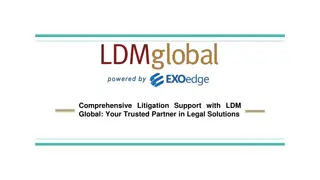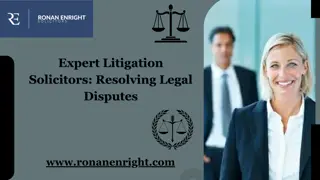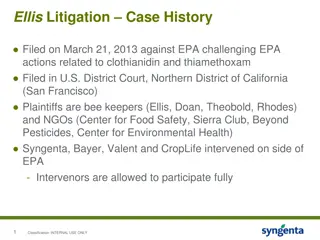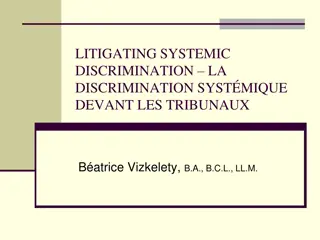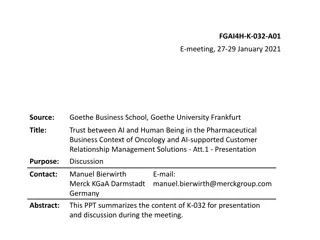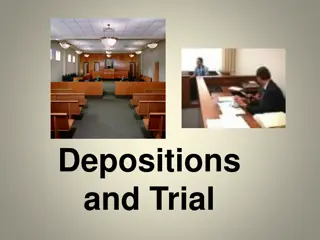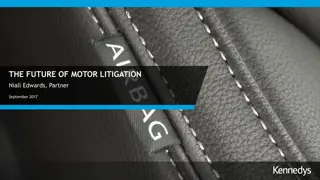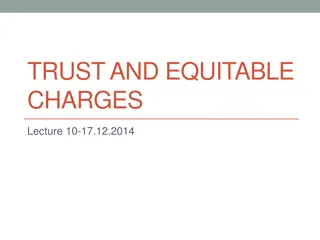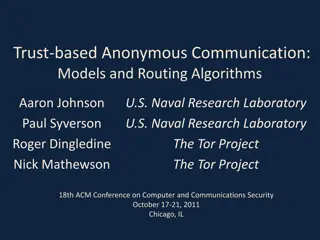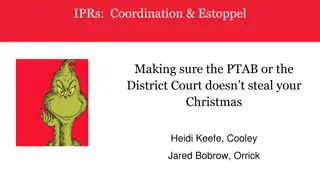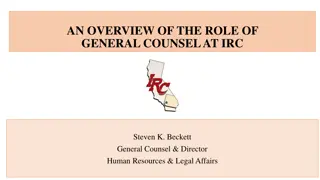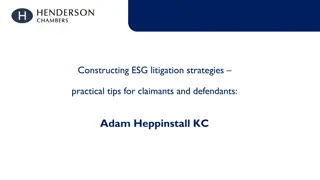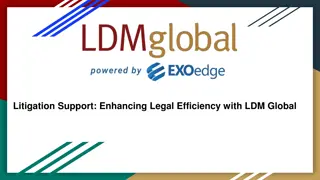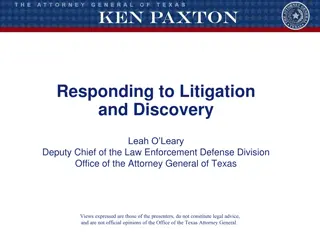Trust Administration and Litigation Strategies: A Comprehensive Guide
Explore essential steps and duties in trust administration, tips to avoid litigation, and navigating legal requirements in estate planning. Learn about serving notices, trustee responsibilities, maintaining beneficial relationships, and legal proceedings notices to beneficiaries. Gain insights from case law and expert advice for effective trust management.
Download Presentation

Please find below an Image/Link to download the presentation.
The content on the website is provided AS IS for your information and personal use only. It may not be sold, licensed, or shared on other websites without obtaining consent from the author.If you encounter any issues during the download, it is possible that the publisher has removed the file from their server.
You are allowed to download the files provided on this website for personal or commercial use, subject to the condition that they are used lawfully. All files are the property of their respective owners.
The content on the website is provided AS IS for your information and personal use only. It may not be sold, licensed, or shared on other websites without obtaining consent from the author.
E N D
Presentation Transcript
2020 TAX AND ESTATE 2020 TAX AND ESTATE PLANNING FORUM PLANNING FORUM Did You Not Notice? Protecting Lawyer and Trustee from Beneficiary Complaints: Roth v. Jelley and Building a Wall of Notice in Trust Administration and Litigation. *** John A. Hartog, Hartog, Baer & Hand, APC Ryan J. Szczepanik, Hartog, Baer & Hand, APC
Initial Step: Notice of Administration of the Trust Initial Step: Notice of Administration of the Trust I. I. A. What is it, when to provide it, and to whom? B. Whether to provide a copy of the terms of the trust. C. Consequences of not serving the notice.
II. II. Staying Out of Litigation by Complying with Staying Out of Litigation by Complying with Trustee Trustee Duties Duties A. To whom duties are owed: Who is the client? Who are the beneficiaries? B. Performance of trustee s duties: Duty to Administer the Trust [Prob. C. 16000] Duty of Loyalty [Prob. C. 16002] Duty of Impartiality [Prob. C. 16003] Duty to Avoid Conflict of Interest & Self-Dealing [Prob. C. 16004] Prudent Person Rule [Prob. C. 16040] Prudent Investor Rule [Prob. C. 16045 et seq.]
II. II. Staying Out of Litigation by Complying with Staying Out of Litigation by Complying with Trustee Trustee Duties (Cont.) Duties (Cont.) C. Maintaining a good trustee-beneficiary relationship [Prob. C. 16060] D. Reports [Prob. C. 16061] E. Accounts [Prob. C. 16062-16063]
III. III. Wading into Litigation: The Notice of Hearing Wading into Litigation: The Notice of Hearing Statutory Law A. 1. Prob C. 17203 for proceedings concerning trusts 2. Prob C. 851 for proceedings concerning transfer of property into or out of trust 3. Prob. C. 15804 (virtual representation statute) may limit which beneficiaries with future interests must be given notice
III. III. Wading into Litigation: The Notice of Hearing Wading into Litigation: The Notice of Hearing (Cont.) (Cont.) B. Case Law 1. In Estate of Reed (1968) 259 Cal.App.2d 14 Charitable beneficiaries were entitled to notice reasonably calculated to reach them. . . . Statutory notice cannot be equated with Due Process. 2. Dohrmann Co. v. Security Savings & Loan Assn. (1970) 8 Cal.App.3d 655, 664 -- Notice given according to statutory ritual will not necessarily meet due process standards.
III. III. Wading into Litigation: The Notice of Hearing Wading into Litigation: The Notice of Hearing (Cont.) (Cont.) B. Case Law (Cont.) 3. Estate of Lacy (1975) 54 Cal.App.3d 172 blind labeling of probate proceedings as in rem does not satisfy constitutional requirements of due process. 4. Mennonite Bd. of Missions v. Adams (1983) 462 U.S. 791 -- Notice by mail or other means certain to ensure actual notice is a minimum constitutional precondition to a proceeding which will adversely affect the liberty or property interests of any party [whose] name and address are reasonably ascertainable.
III. III. Wading into Litigation: The Notice of Hearing Wading into Litigation: The Notice of Hearing (Cont.) (Cont.) B. Case Law (Cont.) 5. Roth v. Jelley (2020) 45 Cal.App.5th 655 Held that grandson with a contingent future interest in a testamentary trust had a property interest in that trust and thus a right to notice by mail before probate court could enter order modifying trust.
III. III. Wading into Litigation: The Notice of Hearing Wading into Litigation: The Notice of Hearing (Cont.) (Cont.) B. Case Law (Cont.) 5. Roth v. Jelley (2020) 45 Cal.App.5th 655 (Cont.) Trial court denies grandson s petition collaterally attacking 1991 Decree as void for lack of due process and failing to comply with Probate Code section 15403 et seq. Trial court appears to seek the most just result considering surviving spouse s ability to carry out her intent to benefit her son only by exercising her power of appointment.
III. III. Wading into Litigation: The Notice of Hearing Wading into Litigation: The Notice of Hearing (Cont.) (Cont.) B. Case Law (Cont.) 5. Roth v. Jelley (2020) 45 Cal.App.5th 655 (Cont.) Trial court finds that: (1) McKie Jr. received his interest in the trust under the settlement agreement while he was alive and Mark s contingent remainder interest therefore did not vest; (2) Probate Code section 11000 did not entitle Mark to notice of hearing on Distribution Petition because he only held a remote contingent interest in trust; (3) Due process considerations did not entitle Mark to notice of the hearing on the petition to approve the settlement or on the Distribution Petition because he did not have a sufficient property interest; and (4) The settlement agreement did not modify the terms of the testamentary trust because the signatories bargained for the vesting and release of their interests.
III. III. Wading into Litigation: The Notice of Hearing Wading into Litigation: The Notice of Hearing (Cont.) (Cont.) B. Case Law (Cont.) 5. Roth v. Jelley (2020) 45 Cal.App.5th 655 (Cont.) Court of Appeal reversed, holding that 1991 Decree was void because Mark did not receive notice before the probate court entered its 1991 Decree. The Court rejected trial court s conclusion that Mark had no due process right to notice. Takers in default hold property interests even if those interests are subject to complete divestment through exercise of a power of appointment. Court rejected argument that satisfying statutory notice requirements for probate is sufficient to satisfy constitutional due process requirements.
III. III. Wading into Litigation: The Notice of Hearing Wading into Litigation: The Notice of Hearing (Cont.) (Cont.) B. Case Law (Cont.) 5. Roth v. Jelley (2020) 45 Cal.App.5th 655 (Cont.) Court declined to adopt trial court s reasoning that Mark s interest never vested because his father took an early distribution. McKie Jr. could disclaim his own contingent remainder interest. Mark had an independent right to his contingent remainder interest. Since Mark was not a party to the settlement agreement it could not divest him of his contingent remainder interest. 1991 Decree was an impermissible vehicle to change the testamentary trust s terms to eliminate all of contingent future remainder interests.
III. III. Wading into Litigation: The Notice of Hearing Wading into Litigation: The Notice of Hearing (Cont.) (Cont.) C. Takeaways from Roth v. Jelley 1. Construe property interest broadly to give notice to every person who holds any right under a testamentary instrument if the order your petition seeks may impair or eliminate that interest. 2. Give notice to all beneficiaries with contingent future interests that are reasonably ascertainable. a) Inquire sufficiently to determine name and address of beneficiaries. 3. Do not treat notice as an issue to consider only as to the initial petition. As new pleadings are filed, reevaluate who is entitled to notice. 4. Evaluate whether intergenerational conflicts do or may exist.
IV. IV. Inadequate Disclosure in Notice Inadequate Disclosure in Notice A. If collaterally attacking an order, ask: was the failure to provide notice of the material facts of the proceeding extrinsic fraud which is a valid ground for setting aside a judgment, or intrinsic fraud which is not. 1. California law holds fiduciaries to a higher standard. Thus, a fiduciary s failure to disclose may be extrinsic fraud when it would amount to intrinsic fraud if they were not a fiduciary. Accordingly, a trustee should disclose to the beneficiaries all facts relevant to the effect of an order on beneficiaries.
V. V. Potential Escape Valve Potential Escape Valve Guardian Ad Litem Guardian Ad Litem A. For minor, unborn and unascertained beneficiaries, consider appointment of a guardian ad item when the order sought will terminate beneficial interests, in large cases, and in disputes that are particularly contentious. 1. Weigh additional expense associated with appointment of a guardian ad litem to be paid from the trust and risk that the guardian ad litem will become an adversary, against risk of a subsequent attack on the court s order far in the future potentially resulting in its invalidation if guardian ad litem not appointed.
VI. VI. Mental Capacity Mental Capacity A. Duty of the Drafting Attorney. An attorney preparing a will has no duty to the intended beneficiaries to investigate, evaluate, ascertain or maintain the client s testamentary capacity. The attorney s primary duty of loyalty is to the client, and this duty might be compromised by imposing such a duty to beneficiaries on the attorney. 1. At least one court has held that when preparing a will or other testamentary instrument giving property to a beneficiary who, under applicable state law, is presumptively disqualified from receiving such a gift , the testator s lawyer owes a duty of care to the nonclient intended beneficiary to try to ensure that the proposed transfer stands up. (Osornio v. Weingarten (2004) 124 Cal.App.4th 304, 334.)
VI. VI. Mental Capacity (Cont.) Mental Capacity (Cont.) B. Defining Capacity. 1. The law presumes all persons have the capacity to make decisions. (Prob. Code 810(a); Estate of Fritschi (1963) 60 Cal.2d 367, 372.) 2. Whether a client lacks capacity depends on the nature of the transaction at issue. (Andersen v. Hunt (2011) 196 Cal.App.4th 722, 730-730 (standard for testamentary capacity in section 6100.5 applies [w]hen determining whether a testator had capacity to execute a trust amendment that, in its content and complexity, closely resembles a will or codicil )
VI. VI. Mental Capacity (Cont.) Mental Capacity (Cont.) B. Defining Capacity. (Cont.) 3. Capacity to Execute a Will: A testator lacks capacity to make a will if, at the time of making it, he or she does not: (1) understand the nature of the testamentary act; (2) understand and recall the nature and situation of his or her property; and (3) understand and recall his or her relations with living relatives and those whose interests are affected by the will. (Prob. Code 6100.5(a).) An individual lacks capacity to make a will if he/she suffers from a mental disorder with symptoms including delusions or hallucinations which delusions or hallucinations result in the individual s devising property in a way which, except for the existence of the delusions or hallucinations, the individual would not have done. (Prob. Code 6100.5(b).) A person subject to a conservatorship may still have capacity to make a will, though not a trust. (Prob. Code 1871(c).)
VI. VI. Mental Capacity (Cont.) Mental Capacity (Cont.) B. Defining Capacity. (Cont.) 4. Capacity to Execute a Trust: Historically, the standard to execute a trust has been less clear. There is no statute akin to Probate Code section 6100.5 for trusts. Thus, most courts have relied on Civil Code section 39, which applies to contractual capacity. (See e.g., Walton v. Bank of California (1963) 218 Cal.App.2d 527, 541.) 5. DPCDA . The Due Process in Competence Determinations Act is codified in Probate Code sections 810 to 813, 1801, 1881, 3201, and 3204. Probate Code section 811 provides an evidentiary framework for proving incapacity to make various kinds of decisions, including the capacity to contract, execute a will and execute a trust. (Prob. Code 811(a).) The mental deficits in Probate Code section 811(a) must affect the person s ability to understand and appreciate the consequences of the instrument at issue. (Prob. Code 811(b).) Diagnosis of a mental or physical disorder is insufficient on its own to support a determination that a person lacks capacity. (Prob. Code 811(d).)
VI. VI. Mental Capacity (Cont.) Mental Capacity (Cont.) B. Defining Capacity. (Cont.) 6. Probate Code section 812 provides a general test for lack of capacity. Under the test, a person lacks capacity to make a decision unless the person has the ability to communicate the decision and to understand the consequences of the decision. (Prob. Code 812.) Specifically, the person must be able to understand and appreciate, to the extent relevant, (a) [t]he rights, duties, and responsibilities created by, or affected by the decision; [ ] (b) [t]he probable consequences for the decision maker and, where appropriate, the persons affected by the decision; [ ]; (c) [t]he significant risks, benefits, and reasonable alternatives involved in the decision. (Prob. Code 812.)
VI. VI. Mental Capacity (Cont.) Mental Capacity (Cont.) B. Defining Capacity. (Cont.) 7. In re Marriage of Greenway (2013) 217 Cal. App. 4th 628 -- Court of Appeal affirmed trial court s determination that Lyle was mentally capable of making reasoned decision to end his marriage notwithstanding that testifying experts agreed that Lyle had dementia. The proper question was whether his impairment was such that he no longer had the capacity of making a reasoned decision to end his marriage. Court determined that a person s mental capacity is fact specific, and the level of required mental capacity changes depending on the issue at hand.
VII. VII. Communication, Disclosure, and Communication, Disclosure, and Information Exchange Exchange Information Frequently, disputes may arise from a perceived lack of information or disclosure, particularly in light of a trustee s duties of disclosure. (See Probate Code 16060, 16061). To guide the trustee, a review of several notable authorities may help: A. In Evangelho v. Presoto (1998) 67 Cal.App.4th 615, the First District Court of Appeal held that while a settlor holding a power to revoke is alive, a trustee has no duty to account to a contingent remainder beneficiary of the trust. However, once the settlor dies, according to the First District s interpretation of Probate Code section 15800, the right to compel an accounting passes to the remainder beneficiaries.
VII. VII. Communication, Disclosure, and Communication, Disclosure, and Information Exchange (Cont.) Exchange (Cont.) Information B. In Salter v. Lerner (2009) 176 Cal. App. 4th 1184, 1188, the Court of Appeal held that [t]he duty to provide information under 16060 is independent of, and potentially broader than, the duty to account under Probate Code 16062. The trial court found that a proposed petition to compel information regarding trustee s conduct would not violate the trust s no contest clause. The Court of Appeal affirmed, reasoning that the request for information reasonably necessary to allow the remainder beneficiaries to enforce their rights under the trust falls under Section 16060, which is nonwaivable. The trustee was ordered to provide the requested information.
VII. VII. Communication, Disclosure, and Communication, Disclosure, and Information Exchange (Cont.) Exchange (Cont.) Information C. In Esslinger v. Cummins (2006) 144 Cal.App.4th 517, a remainder beneficiary asked the trustee to produce trust documents and to account. After sixty days had passed, the beneficiary filed a petition under Probate Code section 17200(b)(7) asking the court to direct the trustee to account for the preceding 7-year period, later amended to a 4-year period. The trial court ordered the trustee to prepare formal accounts for the 4-year period. The Court of Appeal affirmed, holding that although the trustee had no statutory duty to account to the remainder beneficiary under Probate Code section 16062, the beneficiary was entitled to request information under Probate Code section 16061, and, if the trustee did not reasonably comply, to petition under Probate Code section17200(b)(7) to compel an account.
VII. VII. Communication, Disclosure, and Communication, Disclosure, and Information Exchange (Cont.) Exchange (Cont.) Information D. In Estate of Giraldin (2012) 55 Cal.4th 1058, the California Supreme Court held that that remainder beneficiaries have standing to sue a trustee for breaches of fiduciary duty owed to the settlor occurring during the settlor s lifetime, because those breaches could substantially harm the remainder beneficiaries by reducing the trust s value against the settlor s wishes. The trial court found that the trustee had breached his fiduciary duties, removed him, ordered that he account, and ordered that he be surcharged. The Court of Appeal reversed on the basis that the remainder beneficiaries lacked standing to sue for alleged breaches of fiduciary duty during the settlor s lifetime. The California Supreme Court reversed the Court of Appeal, finding that the remainder beneficiaries did have standing to sue the trustee for breaches of fiduciary duty owed to settlor occurring during settlor s lifetime. The Supreme Court reasoned that although Probate Code section 15800 provides that any fiduciary duty was owed by trustee only to the settlor while he was alive, the effect of the statute is merely to postpone the remainder beneficiaries enjoyment of their rights until after settlor s death.
VII. VII. Communication, Disclosure, and Communication, Disclosure, and Information Exchange (Cont.) Exchange (Cont.) Information D. In Estate of Giraldin (2012) 55 Cal.4th 1058 (Cont.) Was Giraldin even necessary? Probate Code section 9654 a statute not mentioned in Giraldin already confers standing on the heirs of a decedent to sue for possession of property or to quiet title. The heirs or devisees may themselves, or jointly with the personal representative, maintain an action for possession of property or to quiet title to property against any person except the personal representative. At least one court has held that claims predicated on fraud, breach of fiduciary duty, or other act which entitles the plaintiff to some relief are, in effect, an action for possession of property. (Olson v. Toy (1996) 46 Cal.App.4th 818, 823.) Therefore, standing to sue for fraud or breach of fiduciary duty is already conferred on heirs and devisees under Probate Code section 9654.
VII. VII. Communication, Disclosure, and Communication, Disclosure, and Information Exchange (Cont.) Exchange (Cont.) Information E. In Drake v. Pinkham (2013) 217 Cal.App.4th 400, a beneficiary alleged that a settlor was incompetent in litigation commenced during the settlor s lifetime. The case settled without a finding on the issue of the settlor s competency. The same beneficiary later contested the settlor s trust amendments after the settlor s death. The trial court found that the beneficiary was aware of the existence and terms of the trust amendments at the time of the earlier litigation and that the allegations of incompetency meant that Probate Code section 15800 did not prohibit the beneficiary from contesting the amendments during the settlor s lifetime. The trial court ruled that several of the actions were barred by the statute of limitations and collateral estoppel. The Court of Appeal affirmed, albeit on different grounds, that the actions were barred by the doctrine of laches.
VII. VII. Communication, Disclosure, and Communication, Disclosure, and Information Exchange (Cont.) Exchange (Cont.) Information F. In Babbitt v. Superior Court (2016) 246 Cal.App.4th 1135, the Court of Appeal held that if the settlor of a revocable trust does not appoint someone other than himself to act as trustee, as was the case in Giraldin, but instead appoints himself to be the trustee, the result is different than in Giraldin. Although the beneficiaries of an irrevocable trust have standing to petition the probate court for an accounting and information after the settlor dies and the trust or a portion of the trust becomes irrevocable, the probate court does not have authority to order the trustee to provide an accounting or information regarding trust assets and transactions while the trust was still revocable, where, as here in Babbitt, there is no claim that the deceased settlor was incapacitated or subject to undue influence during the period of revocability.
